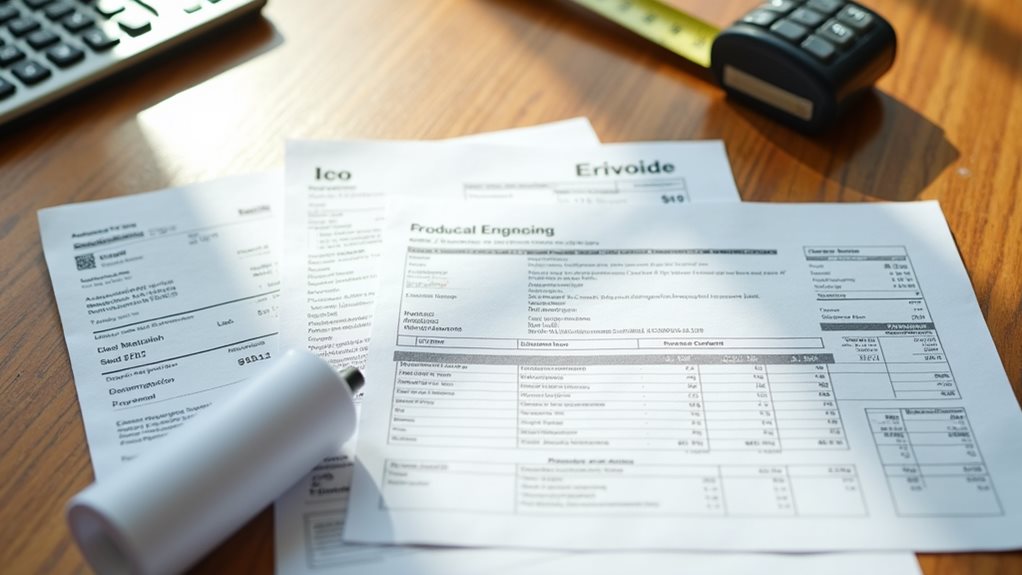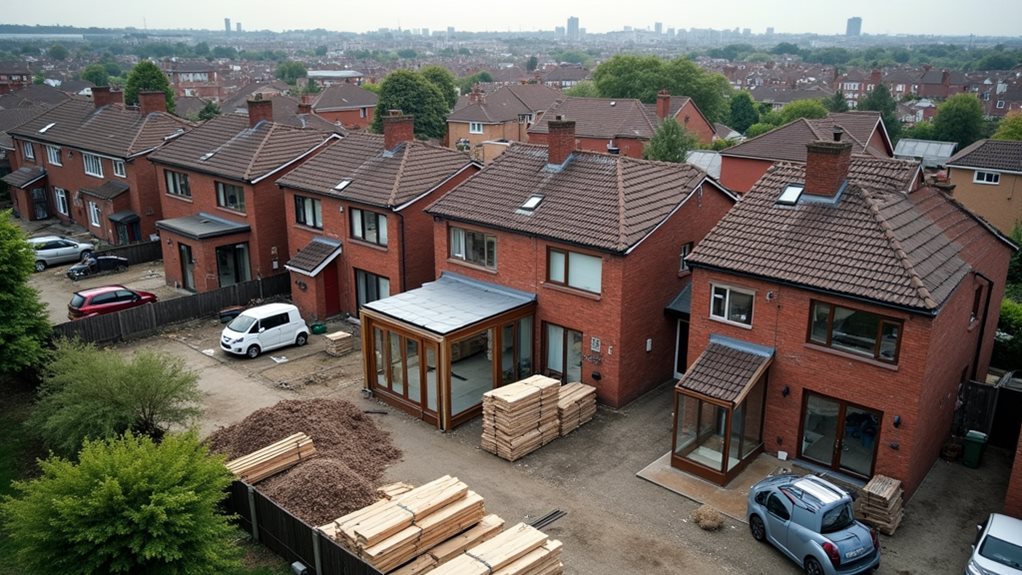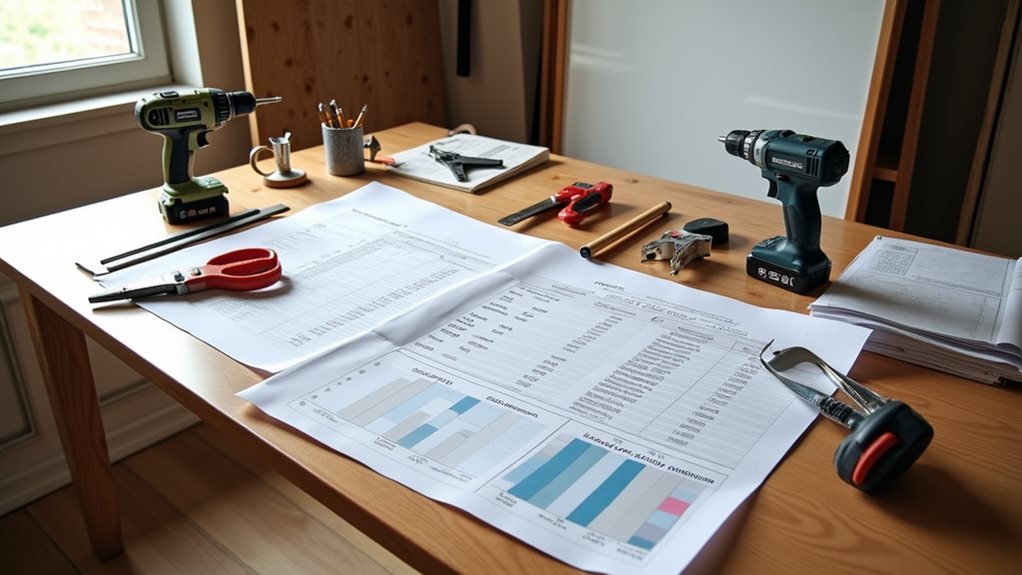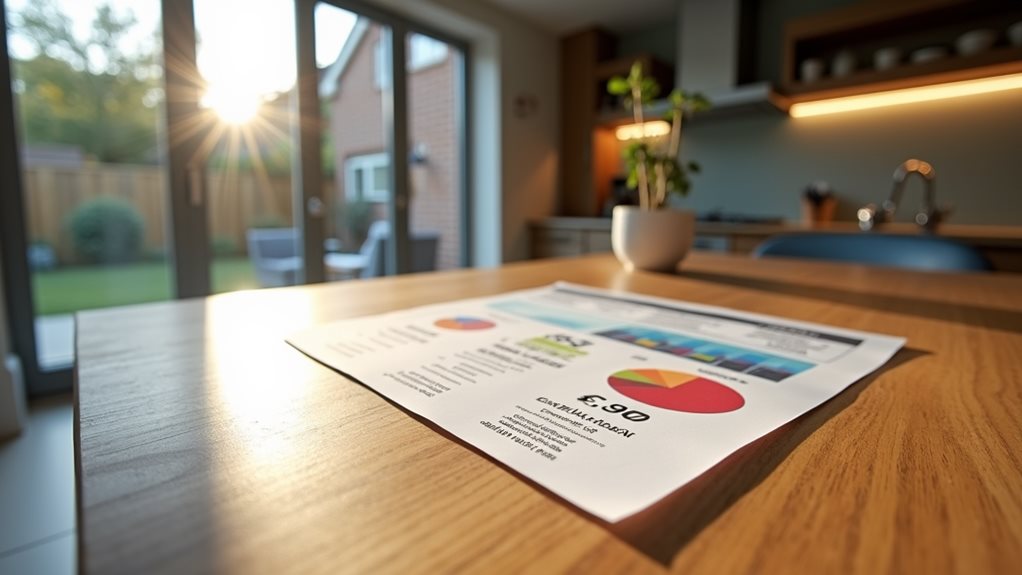Phone:
(701)814-6992
Physical address:
6296 Donnelly Plaza
Ratkeville, Bahamas.

Learn how home extension costs in Manchester are categorized, influencing your budget in ways you might not expect. Discover the details inside!
Home extension costs in Manchester break down into several main categories. You'll typically face construction expenses, which range from £40,000 to £75,000 depending on extension type and size. Labor fees usually fall between £18,000 to £22,000, and can vary based on project complexity. Don't forget about additional costs like materials, design fees, and fixtures; these can add another £5,000 to £30,000 to your budget. Factors like location and property type also play a significant role in overall costs. Understanding these elements will help you plan better, and there's more insight on how to manage your budget effectively.

When considering a home extension in Manchester, understanding the costs involved is vital. You might quickly find that the average extension can set you back between £40,000 and £75,000.
Cost comparison is essential here; while many factors influence the final price, a good starting point is the average cost per square metre, which ranges from £1,200 to £2,000. It's important to note that two-storey extensions are typically 50% more expensive than single-storey options. Furthermore, hiring local builders known for their expertise in house extensions can ensure the best results for your project.
Budgeting strategies can help you navigate these expenses effectively. Think about not just the size and type of your extension, but also the materials you plan to use. High-end finishes can elevate your project cost considerably, so weigh your choices carefully.
Don't forget to account for additional costs such as kitchen or bathroom fittings, which can add anywhere from £5,000 to £30,000.
In the North West, you might appreciate lower labour and architect fees compared to London. Remember, including architect fees—typically 8% to 12% of your total project cost—in your budget will prevent surprises as your project unfolds.
Understanding the different types of extensions available can greatly impact your budgeting process. When considering your home extension, you'll encounter various extension types, each showcasing significant cost variations.
A single-storey extension typically averages between £40,000 and £55,000 and often includes essential expenses like foundations, walls, and plumbing. It's a fantastic way to enhance your space without major upheaval, and it can lead to a 20% increase in property value with careful planning.
If you're looking for more space, a double-storey extension might be your best bet, costing between £50,000 and £90,000. These tend to be more cost-effective per square meter since they share foundation costs but do require careful planning for added structural components.
Side return or wrap-around extensions often range from £1,200 to £3,000 per m², and their unique designs necessitate bespoke architectural services, which can elevate your expenses.
For something different, loft and basement extensions vary wildly in costs, influenced by their specialized structural challenges and potential planning permissions.

The size and location of your home extension play vital roles in determining costs. When it comes to size variation, smaller extensions, like those around 20m², can set you back between £40,000 and £55,000.
In contrast, a spacious 50m² extension might cost you £75,000 to £125,000. It's essential to know these figures because choosing the right scale can make a big difference in your budget.
Location considerations also greatly influence your expenses. In Manchester, for example, the typical cost per square metre ranges from £1,800 to £2,000.
If you're situated in an urban area, expect to pay even more due to local demand and regulations. Additionally, if your property is listed or subject to planning permission restrictions, that could add additional hurdles—and costs—to your project.
Most importantly, understanding how size and location impact your home extension allows you to make informed choices.
Connecting your vision to a realistic budget can transform your home into the haven you've always wanted while ensuring you stay within your means.
When planning your home extension, don't forget to factor in kitchen and bathroom costs, which can quickly add up.
You'll also need to take into account architect and planning fees, as these can greatly influence your budget, especially if you opt for custom designs.
Staying on top of these additional expenses will help you keep your project on track and prevent any unwelcome financial surprises down the road.
Maneuvering kitchen and bathroom extension costs involves more than just construction expenses; additional factors can greatly impact your budget.
When planning your updates, keep these key elements in mind for a smoother financial journey:
These extras not only boost your home's value but also enhance how you live in it every day.
Make certain your design promotes good flow and natural lighting; this ultimately enhances both kitchen functionality and bathroom aesthetics.
Understanding the costs associated with hiring an architect and obtaining planning permissions is essential to effectively managing your home extension budget.
Architect roles can vary considerably, with fees typically ranging from 5% to 15% of your project's total cost. For instance, on a £150,000 build, an 8% fee would total around £12,000. These costs often include planning drawings, which might start at £5,000, and additional services like managing the entire project, possibly adding another £17,500 to £21,000.
Don't forget about planning permissions, which can also impact your budget. Obtaining these can be as much as £200, and architectural drawings for these permissions can range from £500 to £1,000. It's vital to understand these additional expenses to avoid any surprises down the line.
In Manchester, architect fees tend to reflect local market averages, which can influence your final costs depending on project complexity and the agency you select.

When planning your home extension in Manchester, it's essential to understand both the labor duration and costs involved.
Typically, single-storey extensions can take around 11 to 13 weeks, with labor costs ranging from £18,000 to £22,000, but variations can arise based on project specifics.
Estimating the labor duration for home extensions in Manchester can be essential for planning your project effectively.
Understanding how long each phase takes helps you set realistic expectations and stay within your budget.
Here's a breakdown based on extension types:
Each of these timelines includes essential construction phases such as pouring the foundation, erecting walls, and final inspections.
By keeping these labor timelines in mind, you can better communicate with your contractors and feel more confident in your project's progress.
After all, you're not just building an extension; you're creating a space that belongs to you, fitting seamlessly into your life and home.
Comparing labor costs for various home extensions in Manchester reveals notable differences depending on the type and scope of your project.
You'll find that labor rate variations can considerably impact your budget, especially with skilled trades involved. For instance, a single-storey rear extension can range from £18,000 to £22,000, while labor and material costs hover around £1,200 to £1,800 per square meter.
If you're considering a double-storey extension, expect to budget at least £28,000 and potentially much more when you factor in architectural services and other fees.
On the more affordable side, lean-to and side return extensions start at about £15,000, but remember, those costs can bump up quickly with the addition of kitchen or bathroom fittings.
The wrap-around option is another intriguing choice, but it might set you back anywhere from £28,000 to £60,000, depending on the finishes and professional services you choose.
Understanding these labor costs will allow you to make more informed decisions, ensuring your dream space aligns with your financial plans and needs.
Several key factors influence the costs of home extensions in Manchester. Understanding these aspects can help you plan better and avoid unexpected expenses. Here are three essential areas to take into account:
1. Design Complexity: More intricate designs can greatly raise your costs, especially in architectural fees, which can be around 8% of the overall budget.
The more elaborate your vision, the more you'll need to allocate.
2. Extension Materials: The quality of materials you choose affects not just durability but also your total expenditure.
High-end finishes and sustainable materials often come with a higher price tag, so select wisely based on your budget.
3. Location and Size: Where you live in Manchester can impact costs.
Areas with soaring property values may see higher rates for extensions, alongside the size of the extension itself, measured in square metres, which directly correlates to overall costs.

When planning a home extension, it's essential to weigh your financing options carefully to fit your budget and goals. Your loan options can vary widely, so understanding them helps you make informed choices.
Home improvement loans are a popular choice, offering both secured and unsecured options. Secured loans typically come with lower interest rates but do require equity in your property. Just remember, missing repayments can put your home at risk.
Another route is remortgaging, where you move your mortgage to a new lender or borrow more from your current lender. Both strategies leverage your property's value, but carry the same risks—defaulting could mean repossession.
If you're feeling financially stable, borrowing more from your current lender can be a straightforward option too, though it may offer less flexibility.
You could also use personal savings, which avoids interest altogether. Don't forget there are local grants and assistance for those who qualify, making the process even more manageable.
Whatever funding strategies you choose, staying informed allows you to confidently navigate your extension journey.
In summary, understanding how home extension costs break down can save you both time and money. Whether you're planning a modest kitchen expansion or a grand garden room, knowing what to expect helps you stay within budget. With so many factors at play—from location to labor—it's essential to do your homework. So, as you begin this journey, remember: a well-informed decision is the foundation of a successful home extension. Happy planning!